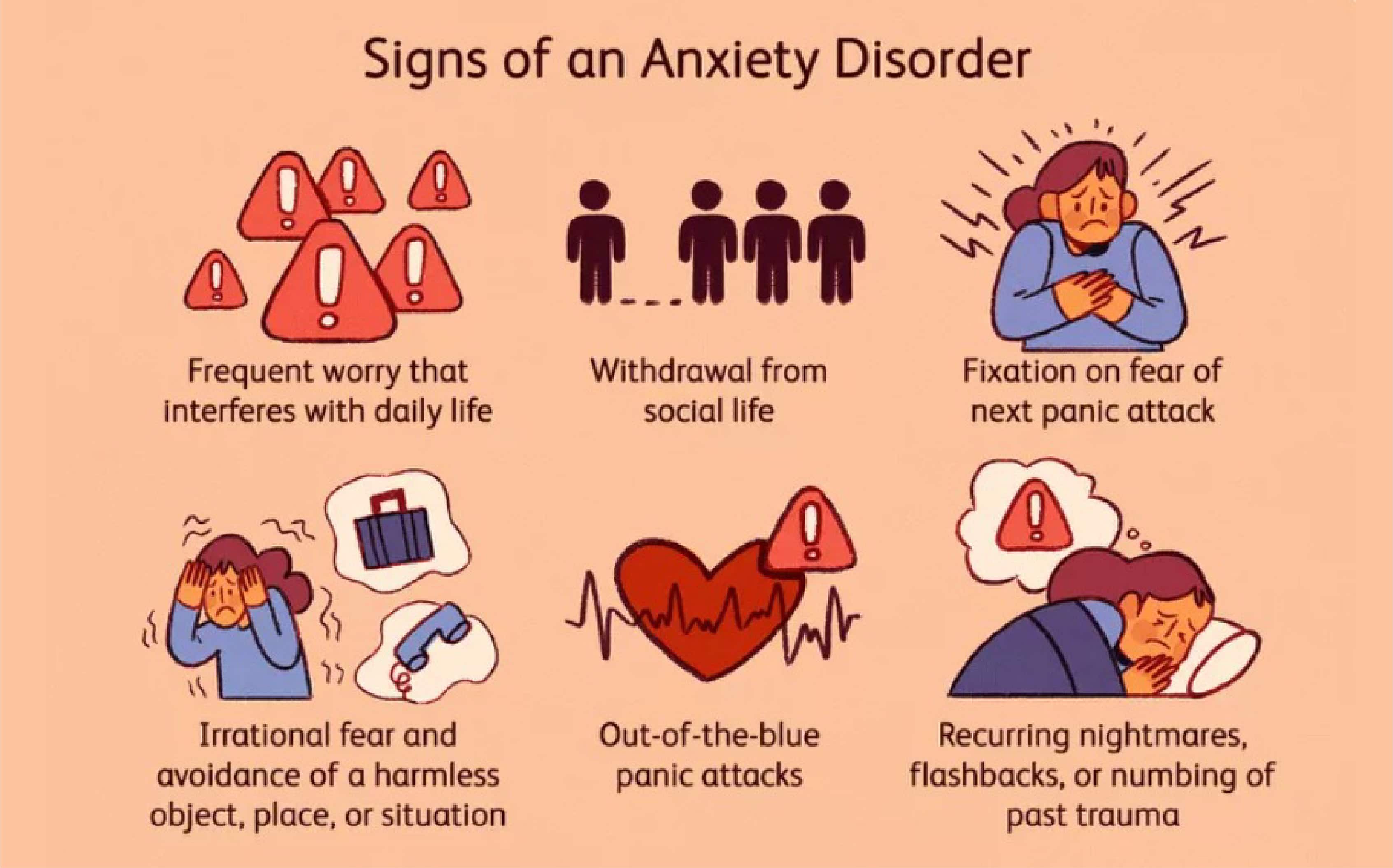Book an Appointment
Call Us+91 9319488481It can be upsetting and incapacitating to suffer from anxiety problems. They could lead to challenges in social and familial interactions as well as a loss of educational and career possibilities. With the right care, such as exposure therapy, attention training, and anxiety management strategies, you can effectively recover and manage your symptoms.The following techniques can be learnt on your own (for instance, by reading books or enrolling in classes) or by speaking with a qualified expert.
It's common to feel anxious from time to time. However, severe, excessive, and constant anxiety and panic over routine events are common in people with anxiety disorders. Recurrent episodes of abrupt, acute sensations of fear, terror, and anxiety that peak in a matter of minutes are common in anxiety disorders (panic attacks).
These anxiety and panic attacks can be long-lasting, cause disruptions to everyday tasks, are hard to regulate, and are overwhelming to the real threats. You can steer clear of circumstances or locations to avoid unpleasant emotions. Symptoms may appear during childhood or the teen years and continue into adulthood.
Examples of anxiety disorders include generalized anxiety disorder, social anxiety disorder (social phobia), specific phobias and separation anxiety disorder. You can have more than one anxiety disorder. Sometimes anxiety results from a medical condition that needs treatment. For most of the anxiety disorders, numerous treatments are available. Let’s learn more about the best anxiety disorder treatment and tips for recovery.
Read Also: The 5 Most Common Mental Disorders: What You Need to Know?
 What is Anxiety Disorder?
What is Anxiety Disorder?Fear, dread, and other sensations that are out of proportion to the situation are indicators of a group of mental health disorders known as anxiety disorders. There are various types of anxiety disorders, such as social anxiety disorder, specific phobias, and generalised anxiety disorder. Effective treatment typically includes psychotherapy (talk therapy) and medicines.
It's common to feel anxious when under stress. In some circumstances, little anxiety might be helpful. It can help us prepare and pay attention, as well as warn us of risks. Anxiety disorders involve excessive dread or anxiety, which is different from normal feelings of nervousness or anxiety. The most prevalent mental illness is anxiety disorder. Approximately 30% of adults experience an anxiety disorder at some point in their lives. However, there are some psychotherapy approaches that can help to treat anxiety-related issues. Most persons who receive treatment are able to lead normal, fulfilling lives.
Read Also: Factors to Consider While Choosing the Best Rehab Center in Hyderabad
Following are common signs and symptoms of anxiety:
Read Also: Multiple Sclerosis Treatment in Hyderabad
Following are the best anxiety disorder treatments:
Read Also: Best Hospital for Brain Stroke Treatment in Hyderabad, India
By following these suggestions, you might be able to manage your anxiety symptoms as they appear and before they worsen. They may require some practice but can become important tools to manage anxiety. These are:
Experiencing symptoms of anxiety can make living more difficult. You may avoid anxiety from worsening over time and control these symptoms in the moment by using a variety of coping mechanisms. Collaborating with a mental health care expert can help uncover the root causes of extreme anxiety and develop effective strategies to improve your quality of life.
Discover the best anxiety disorder treatments and recovery tips from Walk Again, India’s leading neurorehabilitation center. Boost your mental well-being—book a consultation with our expert anxiety specialists today!
Q1: What are common symptoms of anxiety disorders?
A: Symptoms include restlessness, rapid heartbeat, sweating, fatigue, difficulty concentrating, irritability, and sleep disturbances.
Q2: What causes anxiety disorders?
A: Anxiety disorders can be caused by a combination of factors, including genetics, brain chemistry, trauma, or prolonged stress.
Q3: Are there natural remedies for anxiety?
A: Yes, practices like deep breathing, yoga, meditation, aromatherapy, and herbal supplements (like chamomile or lavender) can help manage mild anxiety.
Q4: How long does it take to recover from an anxiety disorder?
A: Recovery time varies depending on the individual, the severity of the disorder, and the treatment approach. With consistent treatment, many people see improvements within weeks or months.